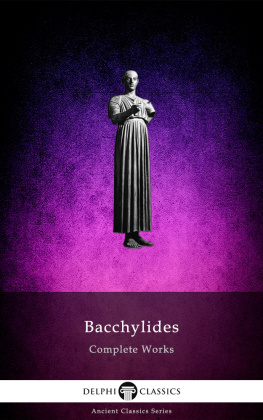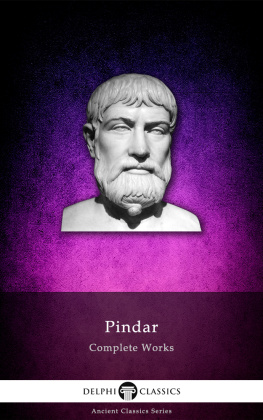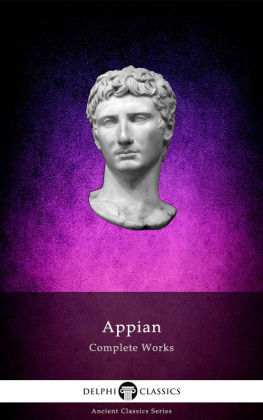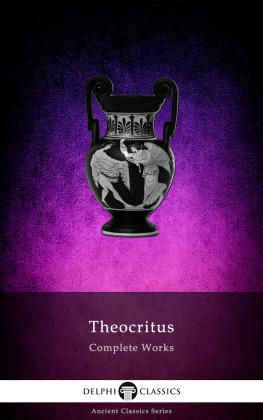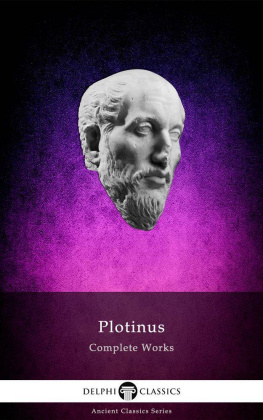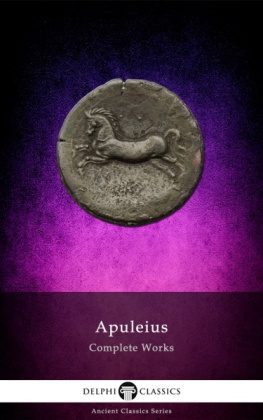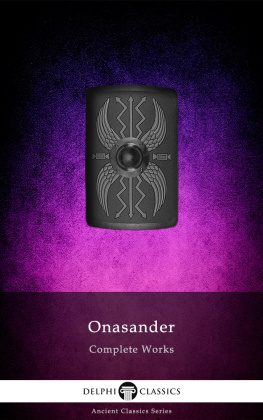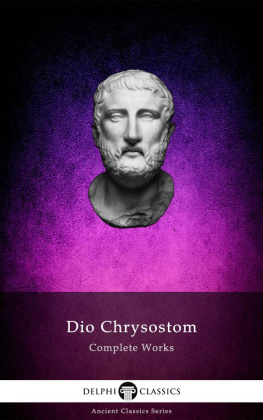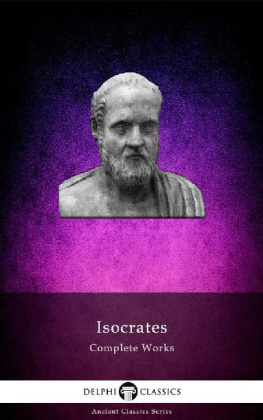
The Complete Works of
BACCHYLIDES
(c. 518c. 451 BC)

Contents

Delphi Classics 2020
Version 1

Browse Ancient Classics







The Complete Works of
BACCHYLIDES

By Delphi Classics, 2020
COPYRIGHT
Complete Works of Bacchylides
First published in the United Kingdom in 2020 by Delphi Classics.
Delphi Classics, 2020.
All rights reserved. No part of this publication may be reproduced, stored in a retrieval system, or transmitted, in any form or by any means, without the prior permission in writing of the publisher, nor be otherwise circulated in any form other than that in which it is published.
ISBN: 9781913487126
Delphi Classics
is an imprint of
Delphi Publishing Ltd
Hastings, East Sussex
United Kingdom
Contact: sales@delphiclassics.com

www.delphiclassics.com
The Translation

Ceos, modern day Kea, a Greek island in the Cyclades archipelago in the Aegean Sea Bacchylides birthplace

Ioulis, present-day capital of Kea (Ceos), including remnants of the ancient acropolis. Like most Cycladic settlements, it was built inland on a readily defensible hill as protection against pirates.

Temple of Athena ancient ruins of Ceos
The Poems and Fragments

Translated by Richard Claverhouse Jebb
The Greek lyric poet Bacchylides (c. 518-c. 451 BC) was the nephew of Simonides of Ceos (c. 556-468 BC) and the rival of Pindar. He was included by later Greeks in the canonical list of nine lyric poets, due to his elegance and polished style. His career coincided with the ascendency of dramatic styles of poetry, as embodied in the works of Aeschylus and Sophocles, and he is often considered one of the last poets of major significance within the ancient tradition of purely lyric poetry. The most notable features of his poetry are clarity in expression and simplicity of thought, making his verses an ideal introduction to the study of Greek lyric poetry and good practice for the more complex workings of Pindars verse.
Bacchylides poetry was not popular in his own lifetime. Whereas lyrics by his uncle Simonides and Pindar were popular in Athens, often being sung at parties, while parodied by Aristophanes and quoted by Plato, there is no trace of Bacchylides verse in the works of Hellenistic writers. Like Simonides and Pindar, Bacchylides composed lyrics to appeal to the sophisticated tastes of a social elite and his patrons, though relatively few in number, covered a wide geographical area around the Mediterranean, including Delos in the Aegean Sea, Thessaly to the north of mainland Greece and Magna Graecia in the west. It has been inferred from the elegance and quiet charm of his lyrics that he only gradually acquired fame in the later years of his career.
The details of his life are sketchy and often contradictory. According to Strabo, he was born in Ioulis, on the island of Ceos, and his mother was the sister of Simonides. According to Suda, his fathers name was Meidon and his grandfather, also named Bacchylides, was a famous athlete; yet another source claims that his fathers name was Meidylus. There is an ancient tradition that he was younger than Pindar and several modern scholars assign his birth to c. 507 BC, though others suggest a much earlier date, c. 524-1 BC. According to Plutarch, Bacchylides was banished for a time from his native Ceos and spent this period as an exile in Peloponnesus, where his genius ripened as he produced the lyrics that would establish his fame.
Ceos had long enjoyed a history of poetical and musical culture, especially in its association with Delos, the focal point of the Cyclades and the principal sanctuary of the Ionian race, where the local people annually sent choirs to celebrate festivals of Apollo. There was also a thriving cult of Apollo on Ceos, including a temple at Carthaea, a training ground for choruses where, according to Athenaeus, Bacchylides uncle had been a teacher in his early years. Ceans had a strong sense of their national identity, represented in exotic legends, national folklore and a successful tradition of athletic competition. The people of Ceos had bravely taken part in defeating the Persians at the Battle of Salamis and so they were proud of their achievements.
Bacchylides career as a poet was likely aided by the high reputation of his uncle, whose patrons included Hipparchus (son of Peisistratos), brother of Hippias the tyrant of Athens (52714 BC) and cultural coordinator of the city at that time. Simonides later introduced his nephew to the ruling families in Thessaly and to the Sicilian tyrant, Hieron of Syracuse, whose wealthy court attracted celebrities of the calibre of Pindar and Aeschylus. Bacchylides first notable success came soon after 500 BC, winning commissions from Athens for the great Delian festival and from Macedonia for a song to be sung at a symposium for the young prince, Alexander I.
He was soon competing against Pindar for commissions from the leading families of Aegina and in 476 BC their rivalry reached its highest point when Bacchylides composed an ode celebrating Hierons first victory at the Olympian Games. Pindar celebrated the same victory, though he used the occasion to advise the tyrant of the need for moderation in ones personal conduct (Olympian Ode 1), whereas Bacchylides ode was more complimentary, no doubt hoping to court future commissions. In 470 BC, Bacchylides was commissioned by Hieron to celebrate his triumph in the chariot race at the Pythian Games. Once again, Pindar composed a celebratory ode for this victory (Pythian Ode 1), offering stern, moral advice for the tyrant to rule wisely. Pindar was not commissioned to celebrate Hierons subsequent victory in the chariot race at the Olympic Games in 468 BC the most prestigious of Hierons victories yet it was celebrated by Bacchylides. Perhaps the tyrant preferred Bacchylides simpler language and less didactic approach. Also, it is likely that Bacchylides and his uncle were better suited to palace politics and shrewd panegyrical practice, compared to their higher-minded rival. Alexandrian scholars have interpreted a number of passages in Pindar that may be construed as hostile allusions to Bacchylides and his uncle.
Next page
